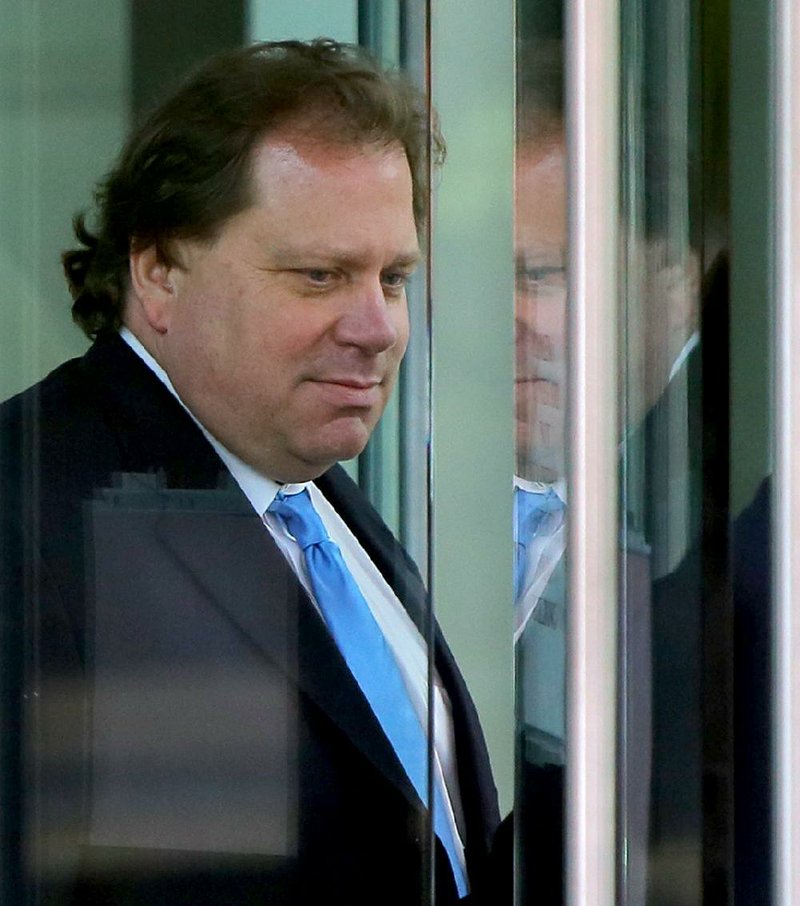Arkansas businessman Ted Suhl, convicted in late October of bribing a state official to protect his business interests, reported to a federal prison in Illinois last week after an appeals court rejected his attempt to remain free while challenging his convictions.
Records at the U.S. Bureau of Prisons showed Monday that the 51-year-old man from Warm Springs, near Pocahontas, is being housed in a medium-security lockup in Marion, in southern Illinois.
Suhl was originally ordered to self-report to a bureau-designated prison by 2 p.m. Jan. 2. But on that day, his appeal of U.S. District Judge Billy Roy Wilson's Nov. 14 order denying his request to remain free while appealing was still pending. A day later, on Jan. 3, the 8th U.S. Circuit Court of Appeals denied the appeal in a nine-word order. It said simply, "Appellant's motion for continued release pending appeal is denied."
The federal prison's website doesn't show the exact day that Suhl checked into the prison, but it says he is expected to be released Feb. 5, 2023 -- a little more than six years from now.
Wilson handed down the seven-year sentence, which doesn't include the possibility of parole, on Oct. 27, in response to Suhl's convictions after a weeklong jury trial in July. Jurors convicted the northeast Arkansas businessman on four of six charges he faced: two counts of honest services wire fraud and single counts of interstate travel in aid of bribery and bribery involving federal program funds.
While parole has been abolished in the federal system, prisoners can earn a small amount of good time toward the end of a sentence, and sometimes are freed into a halfway house a few months before their sentence is scheduled to be complete, to help them integrate back into society. Most prisoners are also credited for any time they have spent in jail while awaiting trial.
In addition to the prison term, which fell between the 6½- to 8-year recommendation for Suhl's crimes and circumstances in federal sentencing guidelines, Wilson ordered Suhl to pay a $200,000 fine. The fine went beyond the suggested fine range of $12,500 to $125,000, which Wilson explained by saying, "Using religion to grease the skids for his crimes is particularly egregious and hurts people who are straightforward in their religious beliefs."
Jurors found that Suhl paid bribes over four years under the pretense of charitable giving to keep Steven B. Jones, then the deputy director of the state Department of Human Services, on a "retainer" to benefit Suhl's companies.
The companies, Trinity Behavioral Health, formerly known as The Lord's Ranch in Warm Springs, and Maxus, provided behavioral health services for youths and received $125 million in state Medicaid funds over that four-year period, April 2007 through mid-September 2011.
Jones pleaded guilty in October 2014 to accepting a bribe from Suhl through a middleman, a former Crittenden County juvenile probation officer and West Memphis alderman, and was sentenced to 2½ years in prison. The middleman, Phillip Wayne Carter, who pleaded guilty to a conspiracy charge and testified against Suhl, was sentenced to two years in prison, though on Sept. 9, Wilson granted the government's motion to cut his sentence in half in return for his cooperation. Carter said he helped Suhl disguise the bribes paid to Jones as donations to a local church.
The state cut off Medicaid funding for Maxus and Trinity after Jones' guilty plea, which effectively shut both businesses down. Jones reluctantly testified that although he took between $10,000 and $20,000 cash that he believed came from Suhl, he never performed any substantial favors for Suhl. Jones acknowledged that he wanted to make it appear to Suhl that he was watching out for Suhl's businesses. Federal prosecutors didn't seek a reduction in prison time for Jones, citing his less-than-cooperative testimony at the trial.
Suhl owned several other businesses besides Trinity and Maxus, but at sentencing, Wilson noted that the businessman had refused to release his financial data to U.S. probation officers as they prepared a pre-sentence report. Wilson also noted that Suhl had earlier told probation officers that his net worth was more than $5 million.
Metro on 01/10/2017


